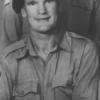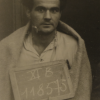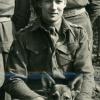Ardennes
On the night of 5th/6th February a patrol led by Lieutenant G. Simpson crossed the River Maas, no contact made patrols continued until the 8th February
Night of 9th/10th Lt Simpson again crossed the River, but his boat capsized on some wire. A patrol led by Lt Nelson was more successful but no prisoners were captured.
On the 11th the river started to rise
Night of 12th February Lt Nelson again crossed the river and secured two prisoners.
Dennis Fox
“At one time, we was on the River Maas and we was asked for volunteers to go over the river to get prisoners. There were 6 in the boat Lt Simpson was the officer on this night that we went over the river. Johnny Day and Bill Bateman I cannot remember the others.
We started looking into all the trenches, looking for the Germans. I was the last man, as we went along the noise we made was a bit loud, some of this noise I was making because my trousers was rather big for me and the mud and water I had collected was making to much noise so Bill Bateman told me. So I stopped and adjusted my dress. I could still hear the same noise, and as I was in the trench I looked up and I could see two Germans. I tried to fire my Sten gun but it didn’t work so I shouted “Hande Hoch” and the Germans gave me their guns. I shouted to Bill Bateman to tell the others that I had got two and we took them back with us.”
Rhine drop
The battalion had one Independent task, which was to send a standing patrol of platoon strength to an important road and rail junction, located in an opening in the large wood between the two Parachute Brigades. This position was some three miles away from the battalion in territory held by the Germans. The original plan had been to send a small party consisting of Lt Nelson from the anti tank platoon, his batman and a signaller with a radio set to go out as a “Troubridge” Party as soon as possible after landing to see if this point was occupied by the enemy and report back to the platoon. If Lt Nelson volunteered or was selected because of his names sakes connection with Captain Troubridge in the Napoleonic war is not clear, unfortunately it is immaterial as he was one of the first casualties and Lt Paterson had to lead No 2 platoon with out any reconnaissance to the location. This he succeeded in doing despite having a difficult journey. There is problems began, knowing that he was out on a limb and would not get reinforcements he had to use his initiative. He held this post for 22 hours frequently being attacked. If he assed that the pending attack was a small affair he used conventional tactics and held his ground. When he reckoned that a large assault was coming he deployed a very unorthodox method, this was to abandon the position and relocate to one of the flaks allowing the enemy to attack his now vacant defences. Once they had cleared the position and were wondering what to do next. Lt Paterson attacked them from the flank. This system worked well and resulted in a large number of Germans being killed and captured. No 2 platoon stayed at this isolated location joining up with the 3rd Parachute Brigade and then the 15th Scottish Division as they advanced from the Rhine…………
Pte Dennis Fox from 1 platoon ‘A’ coy, landed in the same location as Ron Perry but his company took heavy casualties in the woods, of the 133 men in the company. 12 were killed, 35 injured including Lt Robert Nelson the anti tank platoon commander who had taken over temporary command of 1 platoon for the drop from Lt Jack Simpson M.M. Lt Nelson died of his wounds on the 28TH March. 2 men were missing, All of these casualties occurred on the drop or in the wood, 1 Platoon receiving the brunt of these casualties with only 11 men left out of the 39 who comprised the two ‘sticks’ from the aircraft numbered 211 and 212. Sgt Wilkes who is mentioned in Ron Perry account was the 1 platoon sergeant. Typhoons were flying above the DZ as air support and could be called for by radio. This is Dennis’ account
“We were in a wood near the railway station, I had a radio an 18 set so that I could talk to the typhoons in case we saw a tank or something we wanted taking out. Lt Nelson had taken over the platoon for the jump as Lt Simpson had been injured he came by Glider.
A shell exploded an 88 was firing air burst into the wood, my mate Bill Bateman, had his arm blown off, it was hanging from his Denison smock by a thread of cloth. He was leaning against a tree, while I was giving him a shot of morphine. Another shell exploded which knocked me over, on looking up Bill was still standing there but his head had been taken clean off, Lt Nelson had his binoculars blown into his chest, He was still alive, Sgt Johnny Day and a couple of others were dead as well. We managed to get Lt Nelson to this barn. I had been hit in the hand; I went with private Brown and could see other lads from the platoon had been killed in the wood. We had a job to do, so we got on with it. The next day we came back with a big trolley and brought back Bill and Johnny’s bodies. I was then evacuated back to Bruges.”
Source:
Kindly supplied by Sarah Ingram
Read More




Latest Comments
There are currently no comments for this content.
Add Comment
In order to add comments you must be registered with ParaData.
If you are currently a ParaData member please login.
If you are not currently a ParaData member but wish to get involved please register.